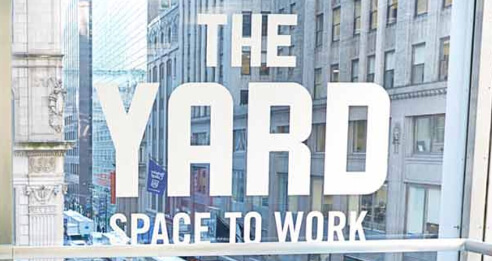
Largest Coworking Companies


With businesses like WeWork, Regus, and Impact Hub on the rise, coworking is one of the buzziest words in both business and real estate these days. But it's not just one practice; coworking could mean dozens of things. It's a concept often used in general terms, so sometimes it makes sense to pick a more specific term for the practice. Below, check out some other words to use.
Before explaining coworking's various synonyms, you should know the general meaning of the word. There are dozens of definitions of coworking floating around out there, but this one gets closest to the word's spirit:
Coworking spaces are shared workspaces often connected with a community approach. Coworkers work collaboratively in a physically shared space.
The basic value of coworking is, first of all, community, but also openness, collaboration, sustainability and accessibility. Now you can dive into the many other forms of the word in the simplest, most accessible terms possible.
There are dozens, but this list is a comprehensive survey of the most popular ones. Not all of them are one-to-one synonyms, so make sure to note the differences between each phrase.
Typically a shared workspace places less emphasis on the community aspect of coworking and attracts more established businesses with traditional services including catering, conference room booking and reception services. From a technology standpoint, shared workspaces typically operate on a more corporate network setup and infrastructure which some companies require for security and performance. Synonyms for "shared workspace" include "flexible office," "shared office," "flexible workspace" and "serviced office space."
Open office mainly refers to the layout of the space, which avoids having walls or even dividers between desks. They are much more open, which comes with aesthetic advantages but often also with productivity disadvantages, including noise or visual distractions.
This is a relatively new term that refers to small-to-medium size companies that are looking to leasing their own space for their headquarters. “HQ as a service” typically means a fully customized and branded space with custom interior designs, which is leased from a shared workspace operator like WeWork.
Startup spaces like Techstars are very similar to coworking when it comes to the communal aspect of the term—they often create a strong sense of community. They differ in how they take clients, though. Veteran accelerator Y Combinator, for example, takes members in batches based on a hard selection process that includes often giving equity in return for a small investment and hands-on advice by experienced mentors.
Typically, innovation labs are created by corporations as a safe place to experiment with new approaches to product and business models. A big motivation is often building relationships with a startup community by hosting events inviting fresh perspectives on trends and innovations happening outside of the view of the company.
Executive suites or centers consist of a grouped number of serviced offices, rooms or suites used traditionally by top managers of a business. Over the years, executive suites started to be used as satellite locations or small business offices with a more corporate touch. One of the most popular providers of executive suites is Regus.
Business centers are spaces in hotels or other non-business properties that are equipped with desks and computers where travelers can work out. They were probably the earliest form of coworking, but they never really took off outside of the hotel industry.
Save your community manager 41 hours each week—learn how The Yard did it with cloud-based access control.
Read the Case StudyThe Guide to Make Your Space More Profitable
Including interviews with experts and consultants.
Free access to our best guides, industry insights and more.
